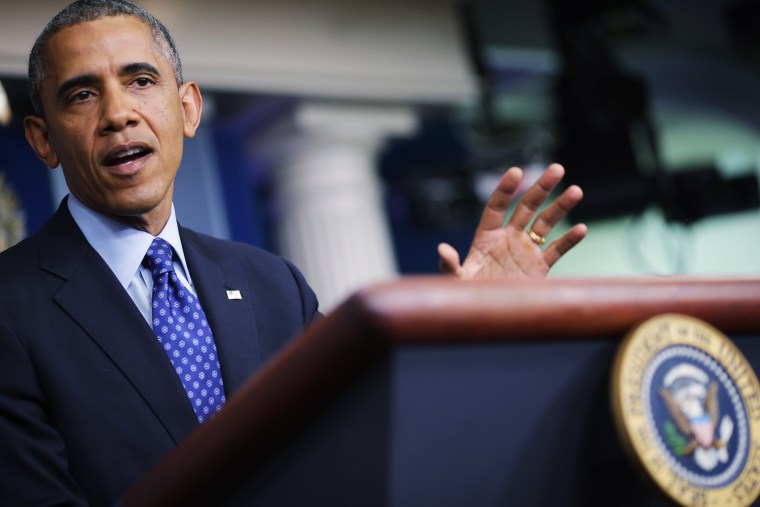Iraqi Prime Minister Nouri al-Maliki faces a “test” of leadership as violent clashes between the Islamic State in Iraq and Syria (ISIS), a Sunni militant group, and Iraqi forces rock the Middle Eastern nation, President Obama said Thursday at the White House.
Obama didn’t expressly call for Maliki’s ouster in his statement to reporters. But as NBC News’ Chuck Todd pointed out, Obama signaled that Maliki may not be able to remain as prime minister.
The president said that as long as deep divisions remain between Iraq’s Sunnis, Shiites and Kurds, “it's going to be very hard for an Iraqi central government to direct an Iraqi military to deal with these threats.”
Obama added that it’s not the United States’ job to “choose Iraq’s leaders.”
The New York Times and Wall Street Journal both reported Thursday that U.S. officials have signaled an openness to regime change in Iraq.
Obama reiterated Thursday that American combat troops will not be deployed to Iraq. But the U.S. is “prepared to take targeted and precise military action” if the situation on the ground requires it, Obama said.
Obama said the U.S. is prepared to send up to 300 military advisers to consult with Iraqi forces. He added that the U.S. has ramped up intelligence, surveillance and reconnaissance efforts, to home in on the exact whereabouts of threats posed by ISIS.
Secretary of State John Kerry will travel to the Middle East and Europe to hold talks on the situation in Iraq.
“It is our interest not to see an all-out civil war in Iraq,” Obama said.
Iraq has descended into near chaos in recent weeks as ISIS, whose fighters control regions of Syria as well as several cities in Iraq, has advanced on Baghdad. The United States has carefully weighed its options in response to the spiralling conflict.
But the president acknowledged Thursday the American public is weary of another war after a decade of conflict in Iraq and Afghanistan. The war in Iraq left “deep scars” on America and “many veterans carry the wounds of war and will for the rest of their lives,” Obama said.
The war “has sparked vigorous debates,” and a lesson from that, Obama said, is that “we need to ask hard questions before we take action abroad – particularly military action.”
“What is in the national security interest of the United States of America? That is what I, as commander-in-chief, stay focused on,” Obama said.
He also spoke about the possibility of Iran stepping in to help quell the unrest. He said Iran can play a “constructive role” if it emphasizes that Iraq’s security depends on an inclusive government.
Obama met with his national security team prior to his statement Thursday afternoon.
Iraq’s problems, Defense Secretary Chuck Hagel said in a statement Thursday, cannot be resolved through American action or military force alone.
“The only viable, long-term solution is a political one that brings together the Iraqi people and addresses the legitimate interests and concerns of all of Iraq’s communities,” he said. “Iraq’s government must summon the courage to unite and lead all of its people.”
